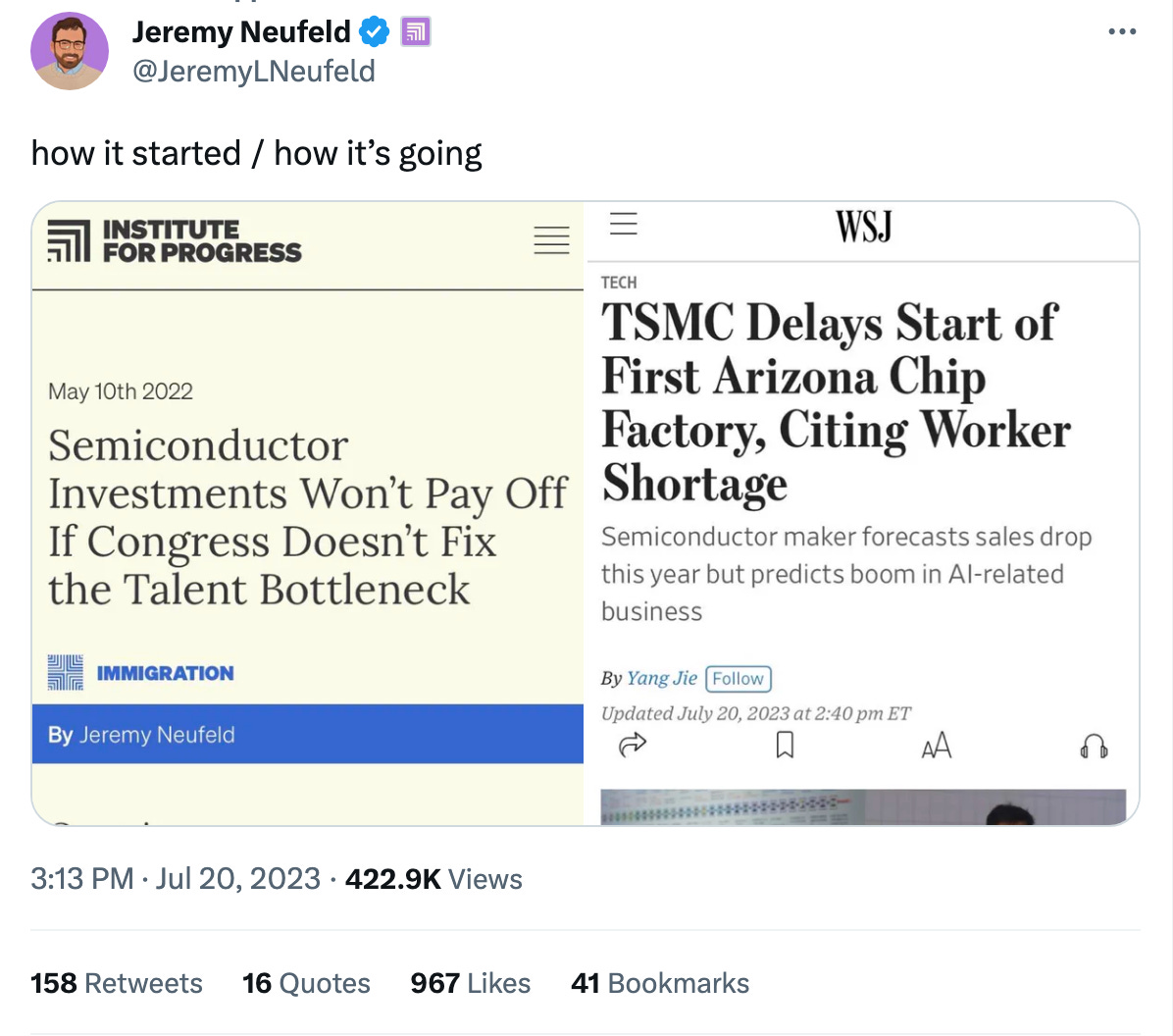Institute for Progress (IFP) — July 2023 Update
Hello!
July was blazing hot in DC — hope you’ve been staying cool wherever you are! Two quick announcements before our regular updates:
Chris Snyder is joining our team as a Senior Fellow to work on policy projects related to market-shaping mechanisms. Chris is the Joel Z. and Susan Hyatt Professor of Economics at Dartmouth College. And Janika Schmitt is joining IFP as a Fellow with a focus on biosecurity-related projects.
Here’s what the IFP team has been up to in the swamp over the last month:
✍️ Published Work
Infrastructure Fellow Aidan Mackenzie and Senior Editor Santi Ruiz wrote a guest post for Noah Smith’s Substack explaining how the National Environmental Policy Act (NEPA) stops the development of clean energy.
“We have no way of measuring the cost of not building — only the cost of slowing and killing projects that have already started. But an honest look at the data we have makes an overwhelming case for reforming NEPA. If we want to see a clean energy transition in our lifetimes, we’ll need to let the infrastructure be built.”
Aidan also wrote about the impressively quick repairs to I-95, and what they tell us about the government's ability to build infrastructure faster.
“To improve state capacity at delivering infrastructure on time, we’ll need to both reward politicians for speedy action, and remove the endless procedural requirements that enable obstruction.”
Fellow Janika Schmitt wrote an op-ed in STAT News with Jacob Swett and Jassi Pannu on how ARPA-H can become better at taking risks.
Contributor Ryan Remmel authored a white paper describing how the federal government can loosen restrictions on at-home rapid tests to help prevent future pandemics.
In a new piece, contributor Maxwell Tabarrok investigated why the NSF was able to move so much faster than the NIH at disbursing pandemic research funding, and found that flexible funding authority may be the secret.
Maxwell’s piece was written up on Marginal Revolution.
Biosecurity Fellow Juan Cambeiro responded to a request for information from the White House Office of Science and Technology Policy on a National Artificial Intelligence Strategy, outlining the potential benefits and risks of AI tools for biosecurity.
🎤 Interviews & Events
Senators Markey (D-Mass.) and Budd (R-N.C.) released legislation to assess the health security risks of AI, and quoted Co-founder Alec Stapp.
“‘This legislation will help our nation become more resilient to the emerging biological threat landscape, which due to the proliferation of dual-use life science technologies, includes engineered and accidental biothreats, as well as naturally occurring bioincidents,’ said Alec Stapp, Co-founder of the Institute for Progress.”
Alec also joined the Reason podcast to discuss how to prevent the next global catastrophe.
📰 Media
Barron’s interviewed Senior Immigration Fellow Jeremy Neufeld on immigration, the CHIPS Act, and how to maintain American technological competitiveness.
“If we stay complacent, we run the serious risk of deterring a lot of the talent that makes the U.S. the world leader in science and innovation. It will also cripple the possibility of being a chip manufacturing leader. Our science and technology leadership against China will suffer, and by extension, our security will suffer.”
In Britain’s City A.M., Adam Hawksbee mentioned IFP:
“Think tanks such as the Institute for Progress inform debates in Washington DC on reforming planning and streamlining science funding.”
The Federation of American Scientists shouted out Senior Infrastructure Fellow Brian Potter’s work in a piece asking for creative ideas to boost housing supply:
“Brian Potter of the Institute for Progress writes about the overlooked roles of modular housing, the rise and fall of the mail order home, and building components.”
Aidan was quoted extensively in Crain’s New York Business on how litigation under NEPA is stopping congestion pricing from taking effect in New York City.
“Aidan Mackenzie, an infrastructure fellow at the Institute for Progress, a Washington-based, non-partisan think tank, said lawsuits as a result of NEPA have become a ‘shadow over the whole process.’ In fact, the Department of Justice said that NEPA is the most frequently litigated environmental statute… Mackenzie said he is skeptical of New Jersey’s claim that it wants a more exhaustive environmental review. ‘The review for congestion pricing is already considerably longer than the average,’ he said, noting that it exceeds what’s required of the more exhaustive review the state is seeking. ‘So, are they really saying that they would have been fine with it if it was 5,000 pages or 6,000 pages? I really doubt it.’”
Aidan was also quoted in a National Journal article on a potential permitting carveout for semiconductor fabs:
“Especially when the process is new or the industry is new, there’s a learning curve that both the industry and government go through,’ said Aidan Mackenzie, an infrastructure fellow at the Institute for Progress, which bills itself as a nonpartisan advocacy organization focused on accelerating science, technology, and industry while ‘safeguarding humanity’s future.’ ‘There’s also interagency disagreement over who has jurisdiction,’ Mackenzie said.

